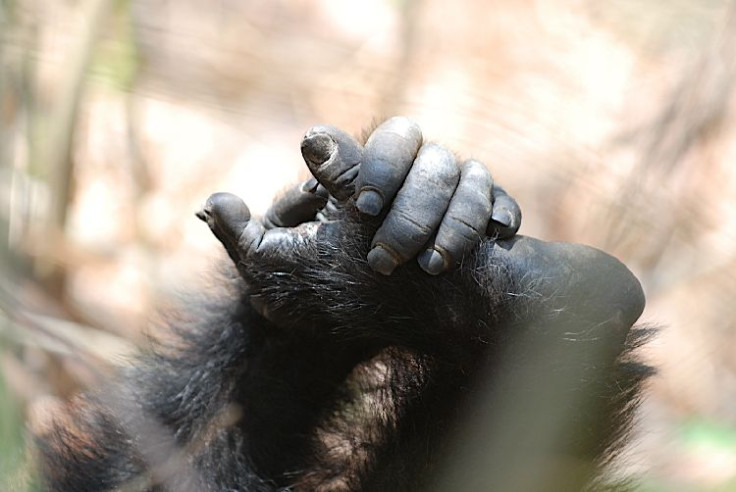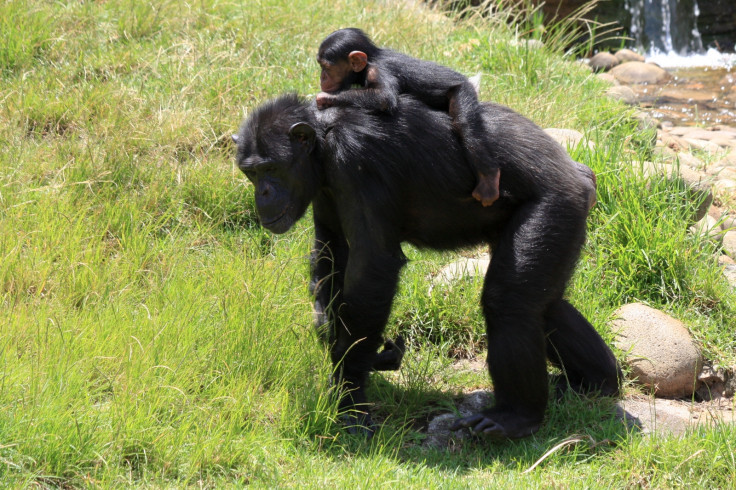No more Mr Nice Chimpanzee? Chimps may not be as selfless as we thought
Scientists claim that previous observations of altruistic behaviour in primates resulted from flawed study designs.
Chimpanzees are wholly selfish animals who act in their own best interests without a thought for their fellow chimps, a new study claims.
The research claims to overturn the conventional wisdom that chimps, like humans, behave altruistically. If confirmed, the findings would show that selfless, altruistic behaviour in humans was not inherited from our evolutionary ancestors.
There have been several examples of "prosociality", or altruistic behaviour, in studies of animal behaviour, including studies of morality in rats and sharing between monkeys.
Selfish animals
But now a group of researchers argues that chimps are actually selfish creatures in a paper published in the journal Nature Communications. This sets chimpanzees apart from humans, the authors say, marking one way in which human behaviour is not shared with our immediate relatives in the animal kingdom.
In the experiment the authors studied how chimps reacted when they were given power over whether a chimp in a cage opposite them would get food or not. For one group of chimps, if they released a wooden peg then a box of food in the cage opposite would be unlocked. For the other group, if they released the peg then the box would lock.
They found that there was no difference between whether the chimps would release the peg or not if it locked or unlocked the other chimp's food. However, when the tables were turned and releasing the peg would lock or unlock a box of food in their own cage, the chimps would always act to make sure that they had access to the box of food.
Controversially selfish
This shows that chimps are not in fact altruistic, the authors claim, overturning previous studies that have documented many examples of altruistic behaviour in chimps.
"There has been an appealing suggestion that the roots of human altruism extend down at least as far as our common ancestor with chimpanzees," study author Keith Jensen of the University of Manchester said in a statement.

The fact that the chimps were put in a new situation where they could interact with unfamiliar objects could have played a role in previous findings of altruistic behaviour, Jensen argues. "The results of this study challenges that view. 'Helping' might have formerly arisen in previous studies as a by-product of interesting tasks."
Claudio Tennie of the University of Birmingham, also an author of the paper, said that although the chimps didn't show any altruistic behaviour, they weren't particularly mean to their fellow chimps either.
"Given that the participants were just as likely to prevent access to food as they were to permit access, chimpanzees are no more altruistic than they are spiteful.
"Even after they demonstrated a clear understanding of the consequences of their actions, they remained indifferent to any effects these actions may have on others. If true, this would mean that prosocial behaviour has developed late in evolution, after our split with the other apes."
Confrontational design
However, other primatologists are not convinced by the study. Frans de Waal of Emory University in the US, has studied chimpanzee behaviour for many years.
"The thing is that about six studies have now demonstrated well-developed prosocial responses in chimpanzees and bonobos, and about a dozen more on monkeys, so that we have little doubt that under a wide variety of conditions primates show prosocial responses," de Waal told IBTimes UK. "Even rats do – [there are] several very nice studies."

An experiment that doesn't show prosocial responses does not invalidate all the other studies that have found animals such as chimps to show altruistic behaviour, de Waal says. He says that he doubts that the apes in the study understood the cause and effect of their actions in the study, and questions the study's design.
"Negative results are always open to multiple interpretations, more so than positive results, so the authors [of the present study], instead of questioning all of the positive studies that we have by now, would do well to examine their own methodology."
De Waal says, for example, that the way the chimps' cages were arranged in the experiment could have led to the unusual results.
"Partners sitting opposite each other in this experiment – which always turns things a bit more confrontational – is one of the main differences with other research, in which partners usually sit side by side, which promotes shared goals. Methodology matters."
© Copyright IBTimes 2025. All rights reserved.






















